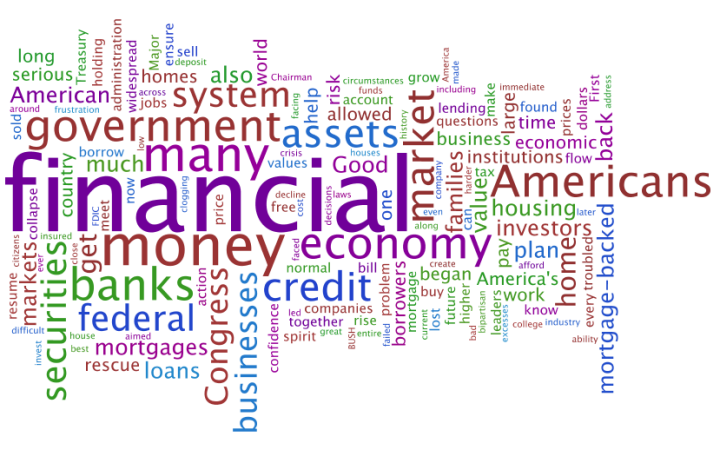"Who deserves most blame for the financial mess we're all in? Is it the bankers? Or should we also save some time for the economists?"
Stephanie Flanders, the BBC's Economics Editor, asks these questions in an episode of Stephanomics, her programme on economics. The episode reviewed here focuses on the economics of the global financial crisis and the problems regarding the Eurozone. This article is, in sorts, a summary of the discussion Stephanie Flanders had with the billionaire investor George Soros, Sir Howard Davies (former chairman of the Financial Services Authority and former deputy governor of the Bank of England), and Dr DeAnne Julius (chairman of Chatham House and a former member of the Bank of England's monetary policy committee). Only the discussion about the global financial crisis has been summarised to prevent the article from becoming too long. To read an article explaining the problems in the Eurozone, click here.
 |
| Dr DeAnne Julius |
 |
| George Soros |
 |
| Sir Howard Davies |
Idea 1: "Something is fundamentally wrong with the [economic] theory."
When Stephanie Flanders began by asking who is to blame for the financial crisis, George Soros gave an answer which was particularly interesting. He said that the problem wasn't really the bankers or the authorities, but what had allowed the authorities to create the rules by which the bankers played. According to Soros, the fundamental problem that had caused the financial crisis was the economic theory.
Soros argued that while economics is in reality a social science, it tries to be a natural science. He elaborated on this idea by explaining that the difference between a natural and social science is that natural sciences follow set patterns and rules whereas social sciences involve dealing with people and their imperfect understandings of the world. Economic theory, in Soros' opinion, tries to create an artificial world where imperfections don't come into play. This, he argues, is the reason why so many of the economic structures that everybody has, up till now, taken for granted, are so fragile.
In some ways, I agree with his opinion. When I was listening to the podcast of this episode of Stephanomics, this idea was the one that particularly struck me. There are quite a few examples where economics has, perhaps, oversimplified situations. The Game Theory, for example, presumes as one of its fundamental 'rules' that all players of the 'game' are perfect Game Theory players. Clearly, this cannot be the case. Surely, aside from when the logic of Game Theory is perceived as common sense by some, the only perfect Game Theory players would be the economists and mathematicians who have studied Game Theory themselves. For those of you who do not know what the game theory is, the most commonly known form of the Game Theory is the Prisoners' Dilemma and an explanation can be found if you click here.
However, it can be argued that for any theory to be formed in any subject, presumptions have to be made, and sometimes, these presumptions prove false, as has been the case with the financial crisis of 2008. Economics is such a dynamic and complex subject with the ambitious aim of creating an understanding of how human decision-making works that there will always be times when people will get things wrong within the subject. Furthermore, economics does acknowledge the 'animal spirits' that we possess and which encourage us to make irrational decisions based on emotional highs and lows and the herd mentality. So perhaps economics hasn't neglected the imperfections of human behaviour, after all.
Idea 2: There is a key difference between the economic conditions how people responded to them
Sir Howard Davies spoke briefly of this idea by first outlining the economic condition of "global imbalances" during the period before the crisis in 2008:
"There was a large excess of liquidity and assets coming from China looking for financial homes and safe assets in the form of loose liquidity conditions. This, in combination with a weak monetary policy, meant that the economic environment had become difficult and it was easy to make mistakes. Within this environment, financial institutions 'drove' badly in the sense that they thought the conditions (of rising house prices) would carry on and so they took on increased debt and borrowing with the impression that they would easily be able to pay them off through selling mortgages and housing. They also created fancy instruments to exploit the condition and make high levels of profit."
When house prices flattened, the monetary policy started to change, but by then it was too late, as the damage had been done as was exemplified by the collapse of Lehman Brothers. Nobody wanted to take over Lehman Brothers because by this stage, the bank was no longer trustworthy and it could not be properly valued as doubts were raised about which of its documents and assets were accountable and reputable. This shocked the world as it had previously been thought that large powerful banks must be "too big to fail" and this thought had been suddenly and devastatingly been proven wrong.
Sir Howard mentioned that he agreed with Soros' idea that the mindset of the regulatory authorities was "touching" in the way they trusted that the market prices were always fair and therefore the they (the regulators) must not challenge the activities of the market.
The reason why the authorities were clearly wrong in holding this belief is that although the market does rectify itself and is fair, this happens in the long term rather than in the short term, so it is important to regulate activities so that too much damage does not occur. In addition to this, creating false demand and unstable booms as had been done is clearly damaging as instead of the market reflecting true demand and showing the true value of goods, it is forced into a skewed position where it must represent the falsities. Through exploiting this situation, some become exorbitantly rich, but the entire world suffered afterwards, especially as the private sector debt was absorbed into the public sector and now has to be paid by governments.
Idea 3: Greed and 'animal instincts' overcame rationality
Although it is clear that the best situation would have been if the regulators and the government had prevented the housing bubble from being created, there are a few reasons why this failed to occur. As Dr Julius explained:
"Individuals in the marketplace have their own incentives and vested interests. While the financial sector was doing well, the government didn't reign back because they could tax the profits made at 25% and so saw a massive increase in corporate tax revenue. Economists, bankers etc. were being paid bonuses according to their own profit pools, so the additional risk benefited them."
The overconfidence in the market and the 'animal spirits' (which Keynes explained as being the herd mentality and the power of emotions in affecting behaviour and consumer confidence) meant that things got out of hand very quickly, especially since in the short term, not many wanted to, or benefited from, stopping the boom.
Dr Julius also mentioned that when she was working in the Bank of England's monetary policy committee just before the financial crisis, the models that the BoE used didn't even have a financial sector - a problem which has now been rectified, but was shocking to hear nonetheless.
Idea 4: There is a problem with the credit system
Throughout the discussion, George Soros was the most sceptical of the three guests on the show. Later on in the discussion, he said that the reason why credit caused the problem of the housing bubble to be created which then 'popped' and led to the global financial crisis was because the credit system is massively flawed.
"What's wrong with credit? ...When credit is involved, there is the making of a self-reinforcing process where the value of the collateral goes up with the willingness to lend which increases the amount of credit you have. This system feeds on itself until it becomes too unsustainable and then it goes to other way and we have a problem like the one that started in 2008."This credit rating system itself was also clearly flawed. Many believe that credit rating agencies should not be private businesses as the ethical argument is that businesses work for profit and it seems ridiculous that organisations that should be helping other firms and the public to make informed decisions about their investments could be being paid by companies to have the agencies give them a good rating. In fact, if the 2008 crisis were to be condensed into the three main problematic factors, they would be:
- The ratings were done badly
- (This led to) an overconfidence in the market
- (Alongside this) the systematic risks were ignored
What next for the economy?
In response to this question, Sir Howard replied that we are now in a hangover period which has been aptly explained in the book This Time Is Different: Eight Centuries of Financial Folly, written by Carmen M. Reinhart and Kenneth S. Rogoff. To provide a brief summary, he said that the book is about the financial crises of the past and how the one that changed the world in 2008 is very different to ones which have occurred in history for the reason that this crisis began in the financial sector whereas previously they have happened within the business cycle (the cycle of booms and busts). This is significant because a crisis beginning in the financial sector with over-leverage and excess of debt will take longer to work off than a crisis beginning in the business cycle of "the real economy" when there is an excess of optimism.
Governments allowed their fiscal positions to deteriorate but now that the debt has been passed on from the private sector to the public sector, there needs to be a balance of policies to optimise the reduction of the debt while minimising the grief caused. This has not been easy and will continue to throw problems at governments around the world for a currently unknown length of time.
What are your opinions on the four main ideas? How has the financial crisis that began in 2008 affected your country? Please comment below and share your ideas.
Sources: http://www.bbc.co.uk/programmes/b016bhsr


0 comments:
Post a Comment
Hi there!
We'd love it if you'd share your thoughts and ideas. Don't forget to check back after commenting because we try to reply to all of your comments.
Just remember to be nice, please!
:)